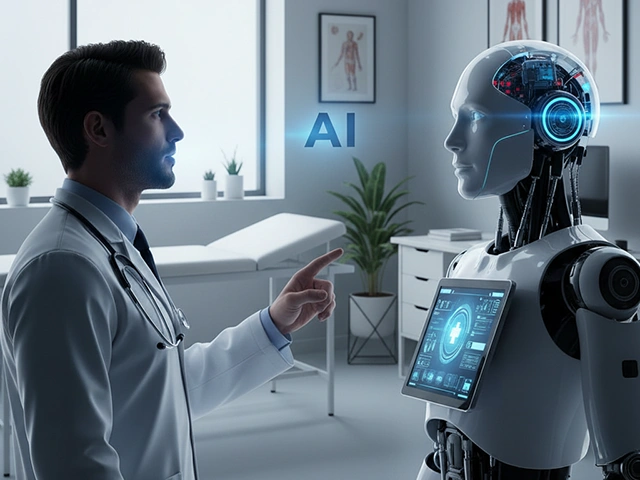But medicine is not stenography. What protects a physician is not a transcript; it’s a coherent account of reasoning at a particular moment in time. That difference—between speech and thought—is where AI transcription-only systems fail.
The Case of the Missing Diagnosis
A man arrives with severe mid-epigastric pain. You listen. Your mind flickers through differentials—peptic ulcer, gastritis, reflux. He speaks quickly, and the room fills with everything else happening in his life.
“Doctor, I’m dying, my stomach is killing me. It’s right here,” he says, pointing to the mid-epigastric region. "Three months now. It’s worse. I lost my job—my wife left and took the kids. I lost my job, Doc. I can’t sleep. I’m going insane. My whole body hurts. My back hurts. I can’t eat. Coffee makes it worse. Sometimes it burns. I took ibuprofen but it wrecks my stomach. I’m so anxious. Everything hurts. I just want help...”
You examine him. The only positive finding is mild mid‑epigastric tenderness; no rebound, normal bowel sounds. You begin a proton‑pump inhibitor, advise against NSAIDs, suggest counseling. He improves and does not return.
Six months later, another physician orders an MRI for worsening back pain: metastases from prostate cancer. The patient tells the new doctor—and later his attorney—“I told my previous doctor about the back pain.”
The transcript preserved the sentence about back pain; the note did not preserve your reasoning about its relevance at the time. The distinction is fatal: recorded is not the same as reasoned.

Why Transcription Creates Risk
Ambient systems save everything because they cannot know what will matter. To defend themselves, vendors increasingly keep audio alongside text even when they promise they wont. Jokes, asides, nervous chatter—now discoverable. Editing becomes a new burden: you must review every line to ensure that a stray sentence doesn’t become tomorrow’s exhibit.
As you know, two conversations take place in every encounter: the words spoken in the room, and the quiet thoughts unfolding in your mind. Transcription captures the first but never records the second. When you revisit the note later, the spark that guided the visit—the fleeting differentials and the choices they compelled—has faded. The chart reads like a summary of sound, not a record of judgment.

What a Modern Record Owes You
A modern EHR should fortify, not flatten, clinical reasoning. It should help you decide, not merely repeat. Think of aviation: autopilot flies most days. When it matters, the pilot thinks. Delegating thinking to automation is not safety; it is amnesia with excellent penmanship.
Curtis E. Harris, M.S., M.D., J.D., Professor of Medical Law, University of Oklahoma

Only Then—A Way Forward
There is a more useful approach: Reflective Ambient Intelligence™. Like a scribe, it transcribes the audio instantly. Unlike a scribe, it captures the reasoning behind the note. It learns your thinking and links decisions to action—orders, prescriptions, letters, instructions—so the record is both explanation and execution.
With each case, the Praxis Concept Processor refines itself around how you practice. The result is not a better transcript; it is a living draft of your reasoning at the point of care.
What Changes for the Physician
| Dimension | Conventional Ambient AI | Reflective Ambient Intelligence™ |
|---|---|---|
| What’s captured | All dialogue converted into clinical language | Dialogue and clinician reasoning |
| What’s actionable | Static text | Orders, prescriptions, letters, tasks |
| Editing burden | High—review every line | Low—review logic, not chatter |
| Legal posture | Broader discoverability (audio + verbatim) | Focused record of decisions and rationale |
| Learning | Generic patterns | Adapts to each physician’s logic |
Experience the Future of AI-based Documentation with Praxis EMR
We invite you to join us for a live interactive demo — a one-hour session to see Praxis in action and get all your questions answered. Our team will contact you to schedule your personalized demo at your convenience.
FAQs for Physicians Considering Ambient AI Scribes
-
Why can transcription-only ambient AI increase physician liability?
Because it records everything said in the room—jokes, asides, and casual remarks—without distinguishing what is clinically relevant. These phrases remain in the legal record, even when they were never meant to be part of the note. When a malpractice case arises, that stray sentence can be cited as evidence, while your reasoning—the most important part—was never captured.
-
Does using an AI scribe reduce my charting time after hours?
It may reduce typing but not editing. Transcription-only systems produce long, cluttered notes that must be reviewed line by line for accuracy and context. Physicians often find that the time saved on typing is lost in verification—and that true efficiency comes only from documenting reasoning, not raw dialogue.
-
How does Reflective Ambient Intelligence™ differ from conventional ambient AI scribes?
Both use audio capture, but only Reflective Ambient Intelligence™ connects what’s heard to what’s thought. It doesn’t just transcribe—it integrates your clinical reasoning as you chart, creating documentation that mirrors your logic rather than merely your words.
-
Will ambient AI really improve note quality—or just shift my workload?
Transcription-only systems often create longer, denser notes full of redundancy. Instead of simplifying your workflow, they shift the cognitive burden from typing to editing. By contrast, reasoning-based systems start with what matters—your thought process—and produce concise, focused notes automatically.
-
What legal and regulatory risks come with relying on AI documentation tools?
If a note was produced by an AI system but signed by you, you remain legally responsible for its contents. Errors, omissions, or unedited phrases in AI-generated text are treated as your own documentation. Understanding what the system captures—and what it doesn’t—is essential to maintaining legal defensibility and professional integrity.
You may also want to read how Praxis EMR Reflective Ambient Intelligence will help you have a faster, safer, and far more personal documentation experience